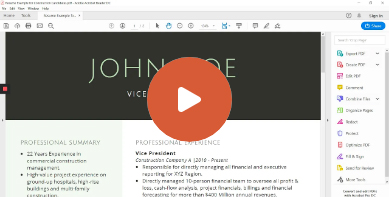Ahhh – the elusive resume. You know – the one that is the bane of your existence that you just never seem to have time to perfect? The truth is, there is no perfect way to build a resume but there are some general conventions that will help ensure your resume is optimized and impactful which will increase the chances of an employer taking the time to read it.
As we start to dabble in video here at Schooner Executive Search, it seemed like the perfect topic to start with. Not only have we built a fictional resume that we have modeled from the best versions we have seen, but we took a few minutes to walk you through it step by step. Click on the video and look – it’s worth your while.
“The truth is, building an effective resume is hard and it’s something you should continually update.”
Rule #1: Shorter is Better
Somehow, people have this tendency to think more is better. Well, guess what? More is just that – more. And to many employers more means more work and it increases the chance that your resume will end up being overlooked. Yikes! Our recommendation is a resume that is one to two pages in length. For senior-level executive, a 2-page resume with an additional 1-page project list is appropriate but again, keep it impactful, concise and focused on your most significant contributions, not necessarily all of them.
Rule #2: Don’t Forget the Project List
This may be a dirty little industry secret, but the fact is that most construction employers are going to start with your project list and work their way back to the body of your resume. Do your contributions and achievements matter? Of course. But your project experience needs to be somewhat transferrable even if it isn’t 100% aligned with the role.
Rule #3: Focus less on WHAT you did and more on WHY IT MATTERED
This may seem like a subtle difference but simply stating your roles and responsibilities is not what separates a leader from a follower. How you took those skills and characteristics and made an impact on your company’s growth, safety record, schedule etc. is what matters. When you sit down to write you resume, ask yourself if what you have written should even matter to a new employer. If it sounds like filler, remove it. Remember, less is more, and you want to make your resume impactful.
Rule #4: Include an Executive Summary
And please, don’t take the wording from your Microsoft Word template! We’re referring to 3-5 bullet points listed out in a side bar that bring attention to your biggest achievements. Were you a Top 40 under 40 recipient? List it there. Did your project deliver the most profitability in company history? Also, worthy of listing in this side bar. Again, this is the Reader’s Digest version of your accomplishments – if you were to summarize your career in 30 words or less, this is where you should list those items.
Shortcutting Your Way to a Brilliant Resume
Guess what? There is no such thing. The truth is, building an effective resume is hard and it’s something you should continually update. Don’t wait until you are out of a job or moving to a new city to start working on yours. Keep a brag sheet and take note of your contributions even when you aren’t actively looking for a new career – your future self will thank you.


Recent Comments